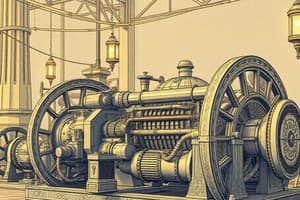Podcast
Questions and Answers
Which type of energy is converted into electrical energy by a generator?
Which type of energy is converted into electrical energy by a generator?
- Mechanical energy (correct)
- Hydraulic energy
- Kinetic energy
- Thermal energy
What is the formula for dynamically induced EMF?
What is the formula for dynamically induced EMF?
- BLV cosine θ volts
- BL sinusoidal volts
- BLV volts (correct)
- BLV sine θ volts
Which rule is used to determine the direction of the magnetic field?
Which rule is used to determine the direction of the magnetic field?
- Right hand grip rule
- Cork screw rule
- Fleming's left hand rule
- Fleming's right hand rule (correct)
What is the name of a D.C. generator that has separate excitation?
What is the name of a D.C. generator that has separate excitation?
What is the name of the part of a D.C. generator that produces the magnetic field?
What is the name of the part of a D.C. generator that produces the magnetic field?
What is the name of the part marked as 'X' in a DC generator?
What is the name of the part marked as 'X' in a DC generator?
Which rule is applied to determine the direction of induced emf in a DC generator?
Which rule is applied to determine the direction of induced emf in a DC generator?
What is the formula used to calculate back emf of a DC motor?
What is the formula used to calculate back emf of a DC motor?
Which type of D.C generator is classified as a cumulative long shunt compound?
Which type of D.C generator is classified as a cumulative long shunt compound?
What is the name of the part marked 'X' in the context of a DC generator pole?
What is the name of the part marked 'X' in the context of a DC generator pole?
Flashcards are hidden until you start studying
Study Notes
DC Generator Components
- Part marked as "X" is known as the Armature Core.
- Other components include Brush, Commutator Raiser, and Commutator Segment.
Types of DC Generators
- Differential Long Shunt Compound: A type of compound generator.
- Differential Short Shunt Compound: Another variant of compound generator.
- Cumulative Long Shunt Compound: Utilizes cumulative action to produce output.
- Cumulative Short Shunt Compound: Similar to long shunt, but with a shorter design.
Induced EMF Direction
- Determined using Fleming's Right Hand Rule.
Generated EMF Calculation
- The generated EMF formula is critical for determining output voltage of a DC generator.
Back EMF Calculation in DC Motors
- Back EMF formula can be represented as E = V - IR, where V is voltage, I is current, and R is resistance.
Another Part Marked 'X'
- Part marked as 'X' can also refer to the Pole Tip, Pole Coil, or Pole Core.
Rules for Electromagnetic Induction
- Corkscrew Rule and Right Hand Palm Rule: Used for various applications in determining magnetic and induced EMF directions.
- Fleming's Left-Hand Rule: Useful for finding force direction on a current-carrying conductor.
Types of DC Generators Reiteration
- Shunt Generator: Windings are connected in parallel (shunt) to the load.
- Series Generator: Windings in series with the load for high current.
- Compound Generator: Combines series and shunt features for better performance.
- Separately Excited Generator: Field winding is powered independently.
Energy Conversion
- Generators primarily convert Mechanical Energy into Electrical Energy.
DC Generator Field Types
- Short Shunt Compound Generator is one type, affecting performance based on setup.
Faraday's Laws
- Reflects the principles of electromagnetic induction governing operation of generators.
Dynamically Induced EMF
- Calculated using the formula E = B * L * V, where B is magnetic field flux, L is length of the conductor, and V is velocity.
Magnetic Field Direction
- Determined using:
- Cork Screw Rule
- Right Hand Palm Rule
- Fleming's Rules for left and right hand to describe different vectors in electromagnetic contexts.
Studying That Suits You
Use AI to generate personalized quizzes and flashcards to suit your learning preferences.





